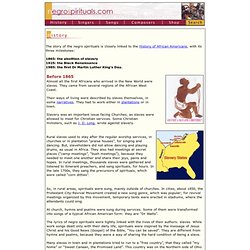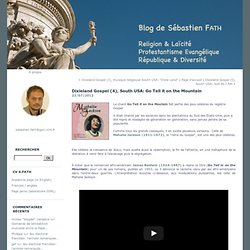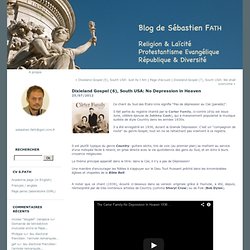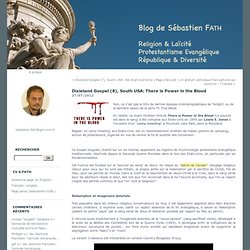

Sweet Chariot: the story of the spirituals. Arthur C. Jones © 2004 by The Spirituals Project No portion of this material may be reproduced by any means without written permission from The Spirituals Project. The spirituals are the religious folk songs created and first sung by African Americans in slavery. "Swing Low, Sweet Chariot;" "Joshua Fit the Battle of Jericho;" "Sometimes I Feel Like a Motherless Child;" "Go Down, Moses;" "Steal Away to Jesus;" "Didn't My Lord Deliver Daniel? ;" "Wade in the Water;" these are some of the best known survivors of the hundreds of remarkable religious folk songs that were created by enslaved African Americans.
In fact, many Americans from all ethnic backgrounds can remember "growing up" with these songs, which were created by a circumscribed community of people in bondage but eventually came to be regarded as the first "signature" music of the new American nation. What is the Difference Between the Spirituals and Gospel Music?
Song from a Cotton Field - Bessie Brown. Field hollers et work songs. Songs from Slavery. Les esclaves et le Blues. History Official Site of Negro Spirituals, antique Gospel Music. The story of the negro spirituals is closely linked to the History of African Americans, with its three milestones: 1865: the abolition of slavery 1925: the Black Renaissance 1985: the first Dr Martin Luther King’s Day.

Between 1865 and 1925 Slavery was abolished in 1865. Then, some African Americans were allowed to go to school and be graduated. At Fisk University, one of the first universities for African American, in Nashville (Tennessee), some educators decided to raise funds for supporting their institution. So, some educators and students made tours in the New World and in Europe, and sang negro spirituals (Fisk Jubilee Singers). Just after 1865, most of African Americans did not want to remember the songs they sung in hard days of slavery.
In the 1890s, Holiness and Sanctified churches appeared, of which was the Church of God in Christ. At the same time, some composers arranged negro spirituals in a new way, which was similar to the European classical music. Dixieland Gospel, zoom sur tubes indémodables (1): I'll fly Away. Dixieland Gospel, zoom sur tubes indémodables (1): I'll fly Away. Dixieland Gospel (4), South USA: Go Tell it on the Mountain. Le chant Go Tell it on the Moutain fait partie des plus célèbres du registre Gospel.

Il était chanté par les esclaves dans les plantations du Sud des Etats-Unis, puis a été repris et réadapté de génération en génération, sans jamais perdre de sa popularité. Comme tous les grands classiques, il en existe plusieurs versions. Celle de Mahalia Jackson (1911-1972), la "reine du Gospel", est une des plus célèbres. Elle célèbre la naissance de Jésus, mais exalte aussi la rédemption, la fin de l'attente, en une métaphore de la libération à venir face à l'esclavage puis la ségrégation. Go tell it on the mountain Go tell it on the mountain, that Jesus Christ is born Halleluya Go tell it on the mountainOver the hills and everywhereGo tell it on the mountainThat Jesus Christ is born halleluya (2x) The sheppard kept their watchin'All over the sheepHe hold the light from heavenThat shone a holy light, everybody.
Dixieland Gospel (5), South USA: Just As I Am. Dixieland Gospel (6), South USA: No Depression in Heaven. Ce chant du Sud des Etats-Unis signifie "Pas de dépression au Ciel (paradis)".

Il fait partie du registre chanté par la Carter Family, ci-contre (d'où est issue June, célèbre épouse de Johhny Cash), qui a massivement popularisé la musique sudiste de style Country dans les années 1930s. Il a été enregistré en 1936, durant la Grande Dépression. C'est un "compagnon de route" du genre Gospel, tout en ne se rattachant pas vraiment à ce registre. Il est plutôt typique du genre Country: guitare sèche, trio de voix (au premier plan) se mettent au service d'une mélopée facile à retenir, en prise directe avec la vie quotidienne des gens du Sud, et en écho à leurs croyance religieuses. Le thème principal apparaît dans le titre: dans le Ciel, il n'y a pas de Dépression!
Dixieland Gospel (7), South USA: We shall overcome. Dixieland Gospel (8), South USA: There is Power in the Blood. Non, ce n'est pas le titre du dernier épisode cinématographique de Twilight, ou de la dernière saison de la série TV True Blood.

En réalité, ce chant chrétien intitulé There is Power in the Blood (Le pouvoir est dans le sang) a été composé aux Etats-Unis en 1899 par Lewis E. Jones à l'occasion d'un "camp meeting" à Mountain Lake Park, dans le Maryland. Rappel: un camp meeting, aux Etats-Unis, est un rassemblement chrétien de masse (proche du camping), autour de prédicateurs, organisé en vue de raviver la foi et susciter des conversion.